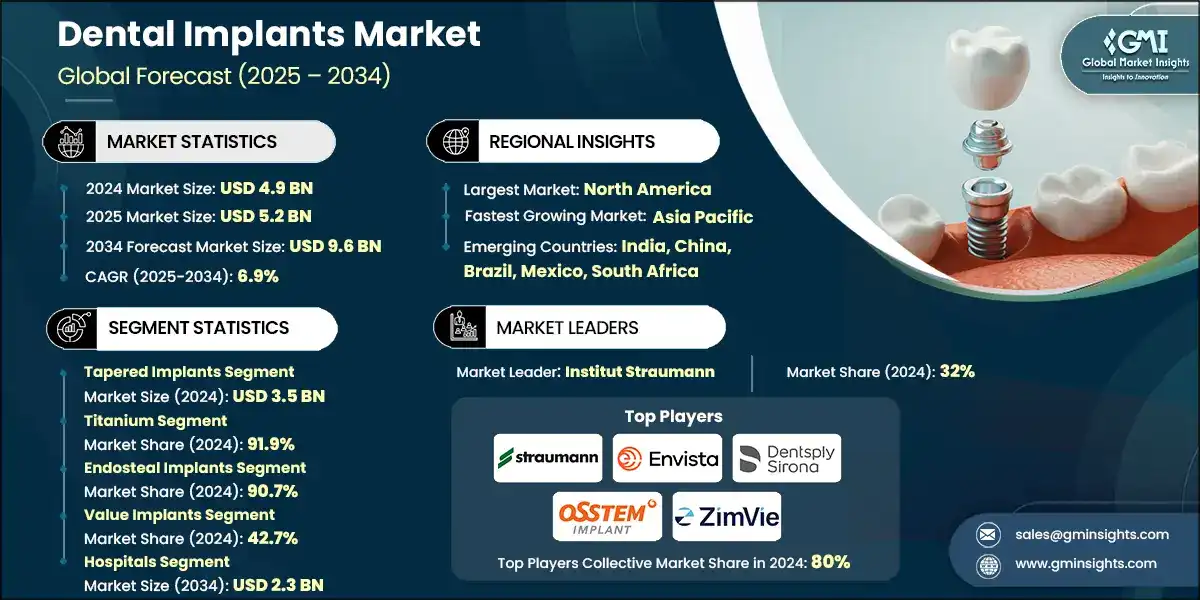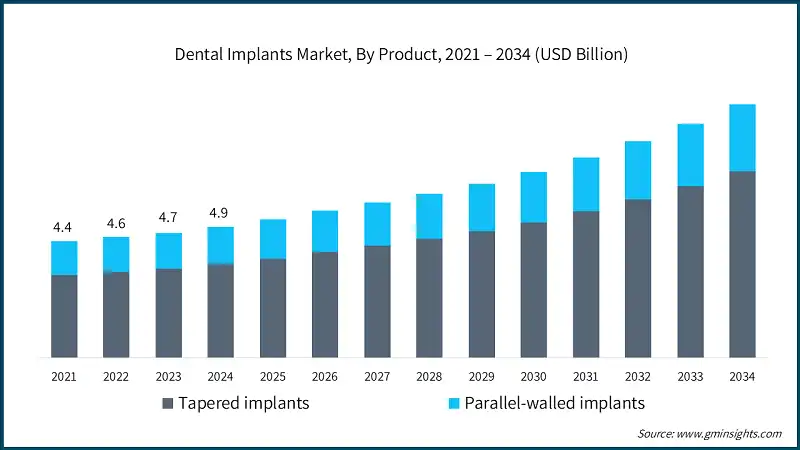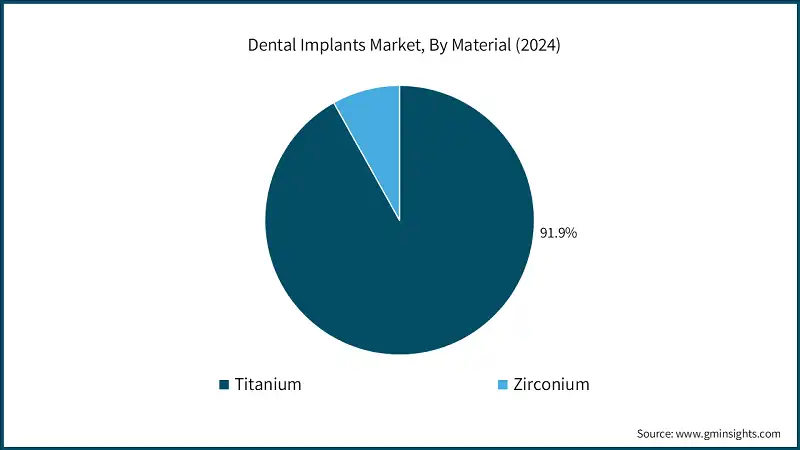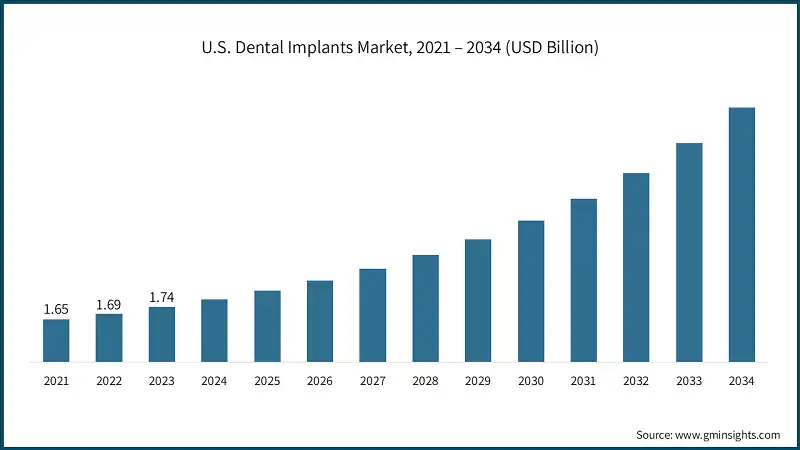Summary
Table of Content

Dental Implants Market
Get a free sample of this report
Form submitted successfully!
Error submitting form. Please try again.
Thank you!
Your inquiry has been received. Our team will reach out to you with the required details via email. To ensure that you don't miss their response, kindly remember to check your spam folder as well!

Request Sectional Data
Thank you!
Your inquiry has been received. Our team will reach out to you with the required details via email. To ensure that you don't miss their response, kindly remember to check your spam folder as well!
Form submitted successfully!
Error submitting form. Please try again.
Dental Implants Market Size
The global dental implants market size was estimated at USD 4.9 billion in 2024. The market is expected to grow from USD 5.2 billion in 2025 to USD 9.6 billion in 2034, at a CAGR of 6.9%, according to the latest report published by Global Market Insights Inc.

To get key market trends
The growing prevalence of dental disease worldwide is a significant catalyst for the growing demand for dental implants. Due to the factors such as changing lifestyles, poor oral hygiene, and greater consumption of sugary contents are pushing the growth of dental oral conditions such as tooth decay, oral injuries and gum diseases. For instance, the World Health Organization (WHO) states that around 3.5 billion people across the globe suffer from oral ailments, among which tooth decay is one of the most prevalent dental conditions.
Additionally, around 2 billion individuals across the globe suffer from caries associated with permanent teeth, and nearly 514 million children suffer from caries associated with primary teeth. Thus, these issues result in tooth loss which in turn boosting the demand for dental implants. Major companies in the industry include Institut Straumann, Envista Holdings Corporation, Dentsply Sirona, Osstem Implant, and ZimVie.
The market increased from USD 4.4 billion in 2021 to USD 4.7 billion in 2023. The global dental implant market is experiencing significant growth due to the growing elderly population worldwide. The population of this demographic are more likely to have conditions such as tooth loss due to the factors such as gum disease, tooth decay, and oral injuries.
Moreover, the condition of tooth loss is predominant among the geriatric age group and often results from years of wear and tear or pre-existing chronic conditions such as diabetes. High blood sugar levels in mouth fluids further accelerate bacterial growth, increasing the risk of periodontal disease, while inadequate oral hygiene also contributes to tooth loss in the elderly population. For instance, according to the data provided by the United Nations, it has been projected that the population worldwide aged 65 years and older will reach around 1.5 billion by the year 2050, which will represent 16% of the entire world’s population.
Moreover, as per the data from the population reference bureau, individuals in the U.S. aged 65 and more is projected to reach 82 million by 2050, from 58 million in 2022. Thus, this demographic shift accelerates the growing demand for the high-quality dental care products including the dental implants, propelling the market growth.
Dental implants are described as surgical components which are incorporated within the jawbone in order to aid dental prosthesis such as crowns, bridges, facial prosthesis or even dentures. At times, these implants may also serve as an orthodontic anchor.
Dental Implants Market Report Attributes
| Key Takeaway | Details |
|---|---|
| Market Size & Growth | |
| Base Year | 2024 |
| Market Size in 2024 | USD 4.9 Billion |
| Market Size in 2025 | USD 5.2 Billion |
| Forecast Period 2025 - 2034 CAGR | 6.9% |
| Market Size in 2034 | USD 9.6 Billion |
| Key Market Trends | |
| Drivers | Impact |
| Increasing elderly population worldwide | Fuels demand for dental implants due to age-related tooth loss and increased need for restorative dental care. |
| Growing prevalence of dental disorders across the globe | Drives adoption of implant as a long-term solution for missing or damaged teeth. |
| Rising demand for cosmetic dentistry | Boosts interest in aesthetically pleasing implant solutions. |
| Advancements in implant technologies in developed countries | Encourages uptake of innovative implant systems with improved osseointegration and minimally invasive placement techniques. |
| Pitfalls & Challenges | Impact |
| Limited reimbursement policies | Restricts access to implant treatments, especially in regions with low insurance coverage for dental procedures. |
| High cost of dental implant treatment | Hampers market growth in price-sensitive regions and among lower-income populations. |
| Opportunities: | Impact |
| Shift towards minimally invasive procedures | Promotes adoption of advanced implant systems and digital workflows that reduce surgical complexity and recovery time. |
| Expansion of dental tourism in emerging countries | Dental tourism opens new markets for affordable implant systems and boosts demand for high-quality yet cost-effective solutions. |
| Market Leaders (2024) | |
| Market Leaders |
32% market share |
| Top Players |
Collective market share in 2024 is 80% |
| Competitive Edge |
|
| Regional Insights | |
| Largest Market | North America |
| Fastest Growing Market | Asia Pacific |
| Emerging Countries | India, China, Brazil, Mexico, South Africa |
| Future outlook |
|
What are the growth opportunities in this market?
Dental Implants Market Trends
- The dental tourism market, which is estimated to reach 24.2 billion by 2032, is a key catalyst for the growth of the dental implants industry. Many patients travel oversea to procure cost effective and high-quality dental care which is unavailable in their home countries. The most popular destination for dental care treatments includes countries such as Mexico, Thailand, Turkey, Hungary, among others which offer a high-quality treatment at an affordable cost as compared to the high-cost regions such as the U.S. and Western Europe.
- For instance, as per the data from the American Dental Association around 40% of the dental tourists from the U.S. choose countries such as Costa Rica and Mexico for the dental treatment to get benefited from the affordable and high-end treatment offered by the trained professionals and modern clinics in those countries.
- Additionally, innovations in the implant technologies for instance, incorporating the biocompatible materials such as zirconia and titanium alloys, is improving the aesthetics, jawbone integration, and as well as improving the durability of the implants.
- For instance, in April 2024, Glidewell launched Glidewell HT implant system made of Ti-6Al-4V ELI (Grade 23) a highly biocompatible material. This launch increased the customer base and provided a competitive edge to the company.
- Furthermore, the use of nanotechnology in the medical devices such as use of nano-hydroxyapatite coatings which enhances the osseointegration by mirroring natural bone structure, ensuring faster healing and robust attachment.
- Thus, these advancements boosting the demand of the dental implant making them a more appealing and accessible long-term solution for tooth replacement.
Dental Implants Market Analysis

Learn more about the key segments shaping this market
The dental implants market was valued at USD 4.4 billion in 2021. The market size reached USD 4.7 billion in 2023, from USD 4.6 billion in 2022.
Based on product, the market is segmented into tapered implants and parallel-walled implants. The dental implants market was estimated at USD 4.9 billion in 2024. The tapered implants segment held revenue of USD 3.5 billion in 2024, and the segment is poised for significant growth at a CAGR of 7.3% during the forecast period.
- Tapered implants are ideal for the treatment of complex cases such as narrow ridges or compromised bone quality due to their higher stability.
- Their conical shape safeguards better contact to the surrounding bones during the insertion, making them effective for immediate loading where the prosthesis such as crown and dentures can be attached to the implants shortly after the placement, rather than waiting for the implant to heal.
- Additionally, the recent research indicates that the success rate of tapered implant is approximately 98.7% within two years of placement, specifically in low bone volume cases or in immediate placements.
- Moreover, the technology used to place these implants are efficient and straightforward which reduces the overall treatment duration. This makes the tapered implant as a more accessible choice for the patient and the dental practitioner.
- Thus, due to their high success rate and their adaptability makes these implants as a top choice among the dental professionals for the complicated procedures. Thereby, propelling the segment growth.

Learn more about the key segments shaping this market
Based on material, the dental implants market is segmented into titanium and zirconium. The titanium emerged as a dominant segment in the market, accounting for 91.9% of revenue share in 2024 and is expected to reach by USD 8.7 billion by 2034.
- The corrosion resistance feature of the titanium implant against the biological environment is the key catalyst of its dominance in the market.
- These titanium implants form a protective oxide layer that prevents the reaction with the biological fluids. This unique property of the titanium implant ensures it durability and stability, making them a reliable material for dental applications.
- For instance, as per the data from the International Journal of Dental Material, the titanium implants are generally made up of 4 nm surface oxide film which protects these implants from the biological fluids, making these implants resistant to the corrosion in the oral environment.
- Moreover, the titanium implants reduce the likelihood of implant degradation, which in turn reduces the requirement of revision surgeries, thus explains it durability and their widespread adoption and usage in the dental care sector.
- In addition, the biocompatible prospect of the titanium is such that the hypoallergenic attribute decreases the chances of allergic reactions that are associated with other metals such as cobalt and nickel. Thus, titanium is considered and used as a safer metal for dental patients with allergic to other metals.
- Therefore, titanium’s modern property such as durability, ability to withstand corrosion, and high degree of compatibility with the bodily fluids, make the titanium as an appropriate material for the dental implants.
Based on type, the dental implants market is segmented into endosteal implants, subperiosteal implants, transosteal implants, and intramucosal implants. Endosteal implants accounted for the largest revenue share of 90.7% in 2024.
- These implants possess a key advantage of protecting the adjacent teeth, unlike the traditional bridgework in which the health neighboring teeth is altered for the support. These implants are placed without the support of the adjacent teeth while preserving the integrity of the neighboring teeth and aiding long term oral health.
- Moreover, these implants give a more natural outcome as compared to other replacement options and endosteal implants can be personalized as per the colour and shape of the patient’s existing teeth. Thus, this aesthetic feature of this implant is important for the individuals concerned with the visibility of dental restoration.
- Additionally, these implants prevent bone loss a common issue that arises from the tooth extraction. Bone loss can lead to an aged appearance and facial sagging. Therefore, these implants provide a more aesthetic appearance by maintaining the structure of jawbone and providing a natural looking restoration.
- Furthermore, as per the estimates, the success rate of these implant is high as compared to the other implants, exhibiting a success rate of around 95%. This high rate of success has solidified their position in the fast-pacing market of dental implant, stimulating the adoption of these implants among the healthcare providers and consumers, thereby accelerating the growth of the segment in the rapidly evolving market of dental implants.
Based on price, the dental implants market is segmented into premium implants, value implants, and discounted implants. Value implants dominated the market, accounting for the largest revenue share of 42.7% in 2024 and is projected for significant growth to reach USD 4.1 billion by 2034.
- The dominance of this segment is largely attributed due to the balance of cost and the quality offered by value implant. These implants offer superior performance at an affordable price as compared to the other types of implants, making value implants more accessible for a larger patient pool.
- Furthermore, the expanding middle class population across the globe is a major accelerator for the growth of this segment. For instance, according to the data from the World Bank the population of middle class is expected to reach 5.3 billion by 2030, with predominant growth is anticipated for the regions of Latin America and Asia Pacific.
- Thus, as the population of middle class expands so does that need for affordable implants among the population seeking cost effective dental solutions, thereby stimulation the adoption of the value implants among the middle-class population.
- Moreover, value implants not only incorporate advance features that a premium implant possess, but they are also made up of durable materials such as titanium metal, which ensures the osseointegration and durability.
- Thus, the cost and the quality balance offered by these implants makes them an ideal option for the dental professionals and patients seeking an affordable solution without compromising the performance of the implant.
Based on end use, the dental implants market is segmented into hospitals, dental clinics, dental service organization, and other end users. Hospitals segment held a revenue share of 23% in 2024 and is projected for significant growth to reach USD 2.3 billion by 2034.
- Hospitals encounter a greater number of patients undergoing complex dental implant procedures which include bone grafting, full mouth reconstructions, and patients with chronic dental illness. Their capability to address and treat both scheduled and emergency dental implant procedures making them a key contributor for the number of implant procedures performed, thereby propelling the market growth.
- For instance, in 2022, in the U.S. alone, around 2 million dental emergencies were handled by hospital’s emergence care facilities, most of which included the placement of implants as part of trauma and restoration work.
- In addition, hospitals in larger cities have high patient turnover owing to referrals from family doctors and dental practitioners, which in turn boosts the demand for the implants in these setting, propelling the growth of the segment.

Looking for region specific data?
The U.S. dental implants market is forecasted to reach USD 3.3 billion by 2034.
- The availability of high skilled dental professionals with specialization in implantology significantly contributing to the market growth in the country.
- For instance, in 2022, the American Dental Association reported around 200,000 licensed dentists in the U.S., with specialization in implantology.
- Moreover, the technological advancements in the implantology as well as in the dental education across the country further fueling the growth of the market in the country.
The dental implants market in the UK is projected to grow significantly from 2025 to 2034.
- The countries well established healthcare system and the rising demand for advanced dental procedures are the key factors propelling the growth of the market in the country.
- Moreover, the growing aging population and increasing awareness regarding the advance dental procedures further solidifying the growth of the market in the country.
- For instance, as per the data from Office for National Statistics, the elderly population of the UK is expected to rise significantly. In 2020, an estimated 2.5% of the total population comprised of people aged 85 and over, by 2040 the figure is projected to reach 4.3% of the total population. Thus, this demographic shift stimulates the need for high quality dental care products including the implants, thereby propelling the market growth in the country.
The dental implants market in the Japan is projected to grow significantly from 2025 to 2034.
- The country has a high prevalence of dental issues such as dental caries, which in turn propels the demand for dental implants.
- For instance, Statista had reported that in the year 2020, approximately 2.9 million people in Japan underwent dental caries treatment. Moreover, the highest incidence was reported in the age groups of 5 – 9 years.
Brazil in Latin America is experiencing significant growth in the dental implants and market.
- Brazil represents a significant and evolving market for dental implants, driven by a high burden of oral diseases and increasing demand for restorative dental care. In 2019, according to National Institute of Health, almost 100 million Brazilians equivalent to 45.3% of the population presented with at least one oral disorder.
- The prevalence of untreated dental caries was especially high, affecting 13.5 million children in primary teeth and over 52 million people in permanent teeth.
- Additionally, 29.5 million suffered from periodontitis, and nearly 22 million experienced edentulism, underscoring the urgent need for effective dental rehabilitation solutions.
- This widespread oral health burden is fuelling growth in Brazil’s dental implant sector, supported by advancements in implant technology and expanding access to care.
The dental implants market in the Saudi Arabia is projected to grow significantly from 2025 to 2034.
- CAD and CAM systems, 3D printing and immediate load implants are some of the innovations in dental implant technologies that are greatly enhancing the treatment of the implant and its acceptance by the patients and practitioners in the country.
- Moreover, the Vision 2030 is setting the foundation for improved enhancements in the healthcare infrastructure which makes these advance dental care solutions easily accessible and increases the adoption of dental implants.
Dental Implants Market Share
- The top 5 players, such as Institut Straumann, Envista Holdings Corporation, Dentsply Sirona, Osstem Implant, and ZimVie, collectively held 80% of the total market share.
- These companies are driving market expansion through advanced implant technologies, digital workflows, and strategic acquisitions across key regions including Europe, North America, and Asia Pacific.
- As part of their marketing strategy these players develop new implant technologies including tapered implants, zirconia implants, and new biomaterials for different patients and better clinical results. These firms are also focusing on improving implants and surface modifications to promote osseointegration and shorten recovery periods.
- Moreover, strategic collaboration with dental professionals, research institutions, and regulatory bodies plays a critical role in advancing product development and ensuring regulatory approval. The development of public awareness and educational initiatives will encourage patients to seek dental treatments, enabling market players to strengthen their position in this growing sector.
Dental Implants Market Companies
Few of the prominent players operating in the dental implants industry include:
- A.B. Dental Devices
- Adin Dental Implant Systems
- AVINENT Implant System
- Bicon
- Cortex Dental Implants Industries
- Dentsply Sirona
- Envista Holdings Corporation
- Glidewell
- Henry Schein
- Mega’gen Implant
- MIS Implants Technologies
- NucleOSS
- Osstem Implant
- Straumann Holding
- ZimVie
- Dentsply Sirona
Dentsply Sirona is a global dental technology company known for integrating digital innovation with clinical excellence. A prime example is the Astra Tech Implant System, which features a unique conical connection and surface technology designed to promote long-term stability and bone preservation. By combining this with digital tools like CEREC for chairside restorations, Dentsply Sirona empowers clinicians to deliver efficient and predictable implant treatments.
Envista Holdings Corporation brings together a portfolio of trusted dental brands, offering a wide range of implant solutions tailored to different clinical and economic needs. Envista’s commitment to innovation and education ensures that clinicians are equipped with the tools and knowledge to succeed.
Institut Straumann is a pioneer in implant dentistry, recognized for its commitment to research, innovation, and premium quality. Straumann’s comprehensive approach, which includes digital dentistry and regenerative solutions, allows clinicians to deliver personalized, esthetic, and durable outcomes for patients across a wide range of clinical scenarios.
Dental Implants Industry News:
- In February 2024, ZimVie Inc. launched the TSX Implant in Japan. This release allowed the company to strengthen its market presence, attract new clientele, and enhance its competitive position in the market.
- In May 2023, Henry Schein, Inc. announced an agreement to acquire S.I.N. Implant System, one of Brazil’s manufacturers of dental implants. This acquisition expanded the company’s market presence and enabled them with increased customer base.
- In May 2022, Osstem Europe, the European arm of Osstem Implant, unveiled the next-generation Key Solution (KS) implant in Europe. Featuring a unique internal design, this system enhances the strength of dental implants and offers a streamlined platform for surgery and prosthesis loading. The launch contributed to the expansion of the company’s customer base.
The dental implants market research report includes an in-depth coverage of the industry with estimates and forecast in terms of revenue in USD Million from 2021 – 2034 for the following segments:
Market, By Product
- Tapered implants
- Parallel-walled implants
Market, By Material
- Titanium
- Zirconium
Market, By Type
- Endosteal implants
- Subperiosteal implants
- Transosteal implants
- Intramucosal implants
Market, By Price
- Premium implants
- Value implants
- Discounted implants
Market, By End Use
- Hospitals
- Dental clinics
- Dental service organization
- Other end use
The above information is provided for the following regions and countries:
- North America
- U.S.
- Canada
- Europe
- Germany
- UK
- France
- Spain
- Italy
- Netherlands
- Asia Pacific
- China
- Japan
- India
- Australia
- South Korea
- Latin America
- Brazil
- Mexico
- Argentina
- Middle East and Africa
- South Africa
- Saudi Arabia
- UAE
Frequently Asked Question(FAQ) :
What was the revenue share of the titanium segment in 2024?
The titanium segment accounted for 91.9% of the revenue share in 2024 and is set to reach USD 8.7 billion by 2034.
How much revenue did the tapered implants segment generate in 2024?
The tapered implants segment generated approximately USD 3.5 billion in 2024 and is expected to witness over 7.3% CAGR till 2034.
What is the market size of the dental implants in 2024?
The market size was estimated at USD 4.9 billion in 2024, with a CAGR of 6.9% expected through 2034. The increasing prevalence of dental diseases globally is driving market growth.
What is the projected value of the dental implants market by 2034?
The market is poised to reach USD 9.6 billion by 2034, driven by advancements in implant technology, rising dental awareness, and increasing demand for aesthetic dentistry.
What is the expected size of the dental implants industry in 2025?
The market size is projected to reach USD 5.2 billion in 2025.
What are the upcoming trends in the dental implants market?
Trends include the adoption of advanced materials like zirconia, digital dentistry solutions, 3D printing for customized implants, and increasing focus on minimally invasive procedures.
Which region leads the dental implants sector?
The U.S. leads the market, with its dental implants sector forecasted to reach USD 3.3 billion by 2034. The growth is supported by the availability of highly skilled dental professionals specializing in implantology.
What is the growth outlook for the value implants segment by 2034?
The value implants segment, which held a 42.7% revenue share in 2024, and is surpass USD 4.1 billion by 2034.
Who are the key players in the dental implants industry?
Key players include A.B. Dental Devices, Adin Dental Implant Systems, AVINENT Implant System, Bicon, Dentsply Sirona, Envista Holdings Corporation, Glidewell, Henry Schein, and Mega’gen Implant.
Dental Implants Market Scope
Related Reports


